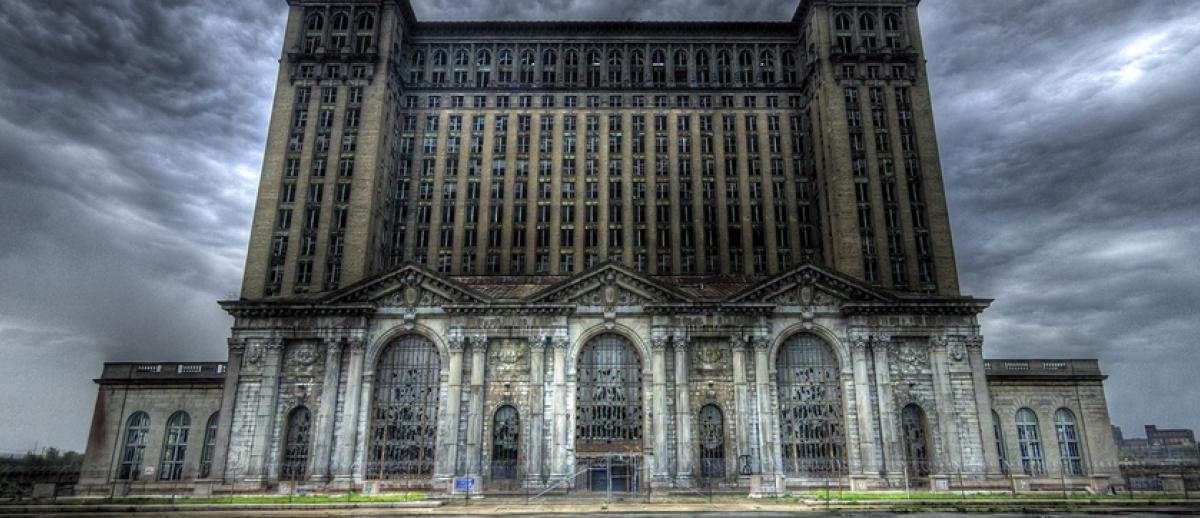A Dialectic of Utopia/Dystopia in the Public Imagination of the 21st Century
archive


A Dialectic of Utopia/Dystopia in the Public Imagination of the 21st Century
An avenue for characterizing one aspect of the public imagination of today’s world—apparently configured by a rising populism across both the left and particularly the right—is with reference to a recent upsurge of interest in utopian/dystopian thinking. Since Donald Trump was elected President of the United States, Aldous Huxley’s Brave New World and George Orwell’s 1984 have resumed prominence in the concerned public imagination and are again top of the bestseller lists. Both works discuss how repressive autocratic/totalitarian elements place subject populations under regimes of total surveillance and propagate “Orwellian” versions of the truth,1 while citizens are palliated by the happy drugs of a somatic culture.2 These dystopian perspectives are contrasted in the conclusion to this piece with my political hypothesis of the “post-modern Prince” with its “feasible utopias” reflected in the imaginaries and collective action of diverse progressive forces.
Utopias have tended to emerge in response to wars, crises, and significant periods of dislocation: in the context of the Peloponnesian Wars, Plato’s The Republic (ca. 380 BC) was premised on creating a good society led by wise elite Guardians. Utopian thought has typically been concerned with concepts of justice, order, the good society, and radical change, often based on common ownership of land/property. Indeed, utopias—and their dialectical other, dystopias—are “ways to interpret the present with an eye to an (imaginary yet positive) future.” A dystopia may be taken as a utopia “that malfunctions” or “only functions for a particular segment of society.” Dystopias “resemble actual societies historically encountered—planned but not planned well enough to be just.”3
These insights seem to capture very well aspects of current imaginaries in US, European, and in some respects world politics.
Important elements of the population who are dissatisfied with the dystopian conditions of growing inequality in the United States (and with it, the end of the American Dream) are separated into increasingly distinct left and right components. On one side, a majority of young educated Americans, particularly those between the age of 18 and 35 with college degrees, actually supports “socialism”—a word that used to be taboo in American political culture. On the other hand, many so-called white Americans, who continue to work but whose conditions of material existence have been undermined considerably over the last 25 years as real wages have stagnated and employment has become more precarious, have tended to gravitate towards the political right. Many of these people voted for a plutocratic billionaire president who is avowedly misogynist, racist, and who delights in scapegoating immigrants and “Others,” claiming that by doing so he can lead a revival in American fortunes. US decline is caused, so the Trumpists argue, by the academic “pointy heads” and Washington élites with their pathetic liberal internationalism. Now Hercules has been chosen by the people to clean the Augean stables—to “drain the swamp.”

Rust Belt Baby. (c) 2006, Gail Trunick
The USA is caught at an impasse amidst a concatenation of global crises, requiring urgent solutions that cannot be addressed simply by a combination of rabid nationalism and the free play of market forces. What seems imperative is a restoration of public goods not just in the United States but also on a worldwide basis. President Trump and his key advisers deny the reality of climate change and various other threats to the biosphere and insist on extending and intensifying a fossil fuel based, energy intensive, and consumerist market civilization while arming America to the teeth so that anyone who might oppose this agenda can be forcibly denied a hearing. Trumpism regards them as enemies of the people. With significant components of the population in a state of denial, public imagination in the United States is in dire shape.
Some observers have called this development a reflection of growing populism. In many respects, however, it closely resembles the extreme inequalities, governing strategies, and reactionary rhetoric that submerged liberalism and democracy in the 1930s.
The USA is caught at an impasse amidst a concatenation of global crises, requiring urgent solutions that cannot be addressed simply by a combination of rabid nationalism and the free play of market forces.
As noted, this seems to reflect the contradictory and regressive condition of public imagination in the United States. It does not fully correspond with developments in the rest of the world. Despite the rise of President Trump and the vocal intensities of his xenophobic allies such as Madame Le Pen in France, Nigel Farage in the United Kingdom, and Islamophobes and immigrant-haters such as Dutch politician Geert Wilders, in the European Union—at least so far—the center has been able to hold. Paradoxically, Trump’s espousal of a particular form of realpolitik and his links, both political and business, to President Putin and to autocrats and dictators throughout the world has tended to produce a renewed political impetus towards European integration and support for its welfare systems, at precisely the moment when centrifugal tendencies such as Brexit had been threatening to splinter the E.U. apart.
Furthermore, my sense is that establishment and popular media organs, many owned and controlled by reactionary plutocrats such as Rupert Murdoch, ignore or dismiss the progressive and imaginative elements at work in the world. These alternative visions are rarely and not fully reflected in official versions of an increasingly monopolized mediated “truth.” Even the edited versions of establishment media “truths” are now repudiated by President Trump and his entourage of plutocrats and right wing political advisers who believe, as did Dr. Goebbels, that it is preferable to employ ultra-propagandandistic narratives endorsing hatred and racialist discourse to discredit opponents, foster discontent, and confuse and inflame the minds of the citizenry.
Nonetheless, we should remember that there are and always will be alternatives—and many of these uphold ethical principles associated with solidarity, social justice, and constraints on the arbitrary use of violence.4 Progressive imaginaries seek to protect the sanctity of life on the planet in a quest for the “development of sustainability”—not simply the “sustainable development” advanced by corporate America and included in the business plans and advocacy work of companies that exploit nonrenewable resources and call for business as usual. This is why organizations such as the World Social Forum and other forms of activism give rise to a certain kind of optimism of the will—alternative utopias that envision the possibility of global cooperation across civilizations in a way that is sustainable for both the biosphere and the peoples of the planet.

Global Climate March, Paris 2014
In sum, assessing the public imagination must relate not simply to disorientation, to conditions of bare life or to the narrow economism of mainstream debates over Brexit and budget deficits. It also involves a dialectic of utopia/dystopia. One element in this thinking is what I call a “feasible utopia” of the “post-modern Prince.” It builds upon Gramsci’s concept of the Modern Prince (1929-35), which was his response to the dystopias of the 1930s and an effort to think through the possibility for the emergence of a new democratic communism. Gramsci had drawn upon Machiavelli's The Prince (c.1532), a work that sought to discern the contours and possibilities of an ethical state amid the crises associated with the external domination of Italian principalities by major European powers during the Renaissance. Both works consider the internal and external determinants of the possibilities of political transformation.
Assessing the public imagination must relate not simply to disorientation, to conditions of bare life or to the narrow economism of mainstream debates over Brexit and budget deficits. It also involves a dialectic of utopia/dystopia.
The “post-modern Prince”5 is a political hypothesis that seeks to relate new forms of political agency to the conditions, crises and contradictions of our times. It reflects plural, progressive forces in collective action, with the goal of recreating work and society and their relations to nature and the biosphere in a fruitful, forward looking and socially just manner that is welcoming to the dispossessed, the refugees, and the outcasts of the planet. The concept is an attempt to capture new imaginaries, many from the creative ranks of indigenous peoples, landless workers, women’s groups,6 concerned scientists, public workers, progressive trades unions, environmentalists, and peoples young and old seeking to forge new political alternatives, both real and imagined. Here I should emphasize that much of the most forward-oriented political thinking of the post-modern Prince, encompassing new imaginaries and epistemologies, rises from among indigenous peoples and is articulated by collective leadership involving both men and women; indeed, the post-modern Prince is simultaneously the post-modern Princess!
What is at issue here is the idea of an alternative type of society—a feasible utopia—appropriate to the post-modern conditions of the 21st century and its potential future. As Gramsci once put it, the Modern Prince—the myth-Prince—cannot be a real person, it must be a set of political forces that are actually asserting and recreating themselves, engaging in the making of history. One of the principles of the post-modern Prince—understood in the plural—is epistemological, namely that knowledge should not be treated as a commodity, but as part of the global commons as it is built from the broad intellectual and cultural heritage of humankind. Other key principles of the post-modern Prince are associated with human dignity and equality, democracy, social justice, political accountability, public healthcare, and the development of an ethic of caring and sustainability. The praxis of the post-modern Prince/ Princess invokes a radical politics of redistribution, recognition, and emancipation.

Of course, this set of democratic and radical potentials has to be assessed in relation to the dominant reactionary and regressive alternatives now being posed as challenges to the supremacy of market-based disciplinary neoliberalism. Institutionalized over the past 30 years, its resilience should not be underestimated.
A key question in this context concerns the political fate of the middle classes in both North and South and how far they will orient themselves politically towards more progressive or reactionary futures.7 Such preferences are forged in the context of a citizenry among whom many are disoriented by the stresses, dislocations and dystopias associated with a hypercompetitive and historically myopic/somatic market civilization. This vortex of social forces indicates that rather than history ending, a new phase of global struggle has begun. We may be at an historical crossroads.8
Editor's note: This essay was originally published in the global-e series on Public Imagination, but because it contributes importantly to an assessment of Gramsci’s relevance in the contemporary global conjuncture it is thematically also at home in this series.
1 It is also important to reflect upon wider issues of surveillance (Big Brother) in relation to
a post-modern dystopia that seeks to put everyone and everything under constant
24/7 monitoring by the Pentagon and NSA. This project is intended to inscribe the
disciplinary gaze of its imperial power on everyday life, facilitated by the social
technologies and the compliant accumulation strategies of firms like Facebook,
Apple and Microsoft. President Trump promises to intensify such surveillance. For
an earlier attempt to theorize this aspect of global politics see: Stephen Gill, (1995)
“The global panopticon? The neoliberal state, economic life, and democratic
surveillance.” Alternatives: Global, Local, Political, 20 (1): 1-49.
2 In the US today, according to Nicholas Eberstadt (author of “Men Without Work: America's
much as one in eight of the US male population aged between 25 and 54. These are
people who do not work for income, nor indeed do any kind of work, including
housework. They are not registered as unemployed since they are not seeking work.
They spend their days watching television, or surfing the Internet under the influence
of antidepressant drugs. For more detail see transcript: “An Economist On The
‘Miserable 21st Century’,” National Public Radio, February 25, 2017. Weekend
Edition, Saturday.
3 Michael Gordin et al., eds. (2010). Utopia/dystopia: conditions of historical possibility.
4 For example, drone strikes against so-called adversaries causing casualties amongst
5 For extended discussions of the post-modern Prince and the idea of a feasible utopia,
Macmillan-Palgrave: 237-269.
6 Witness the large-scale marches and demonstrations in hundreds of cities world-wide
7 One dimension of this question concerns whether they will favor the extension of the
greater social inclusion, improved provisions for social reproduction and
stewardship of the biosphere, and more generally the socialization of risk on
behalf of the majority. By contrast, many middle-class people associated with
self-employment and small businesses, for example, may well favor further
marketization of social and economic life, more gated communities, and the
repression and othering of strangers and the marginalized.
8 On a range of issues relating to the crossroads of history see Stephen Gill, ed.,
the Future. Palgrave Macmillan: 181-199.



